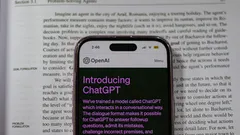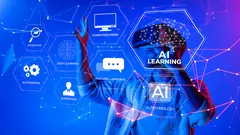85
9
4 minutes
Suggested Articles

GPT-5 is about to redefine AI with game-changing human-like abilities
Explore how the upcoming GPT-5 AI model promises to redefine artificial intelligence by uniting the strengths of all previous generations in a single revolutionary tool. Get essential insights into its predicted capabilities and impact on business, education, and everyday life.

How ChatGPT is changing memory and creativity in daily life
AI & Everyday Tech

Generalist AI is revolutionizing daily life and powering a new tech era
AI & Everyday Tech

AI myths debunked: The real magic behind artificial intelligence revealed
AI & Everyday Tech

The Simple ChatGPT Prompt That Instantly Boosts AI Accuracy and Trust
AI & Everyday Tech

Tech leaders weigh risks as Czech government bans DeepSeek over data privacy
Online Safety & Privacy

Tech users face real risks as ChatGPT blurs the line with AI-generated Windows keys
AI & Everyday Tech

Unlock Your Productivity and Privacy With a Local AI Assistant on Your PC
AI & Everyday Tech

Generative AI Is Quietly Transforming Workflow Automation Across America
AI & Everyday Tech

How AI and Micro-Credentials Are Reshaping Future Careers in Tech
AI & Everyday Tech

Playing video games together strengthens relationships and sparks real connection
AI & Everyday Tech

US crypto pioneers transform bold risk into life-changing fortunes
AI & Everyday Tech

Tech leaders embrace waste-to-carbon solutions as Microsoft bets big on green AI
AI & Everyday Tech

Travelers and campers embrace portable backpack laundry tech for freedom and clean clothes anywhere
Gadgets & Reviews

Sleep experts champion a smart anti-snoring belt for restful nights and healthier mornings
Gadgets & Reviews

Drivers use Google Maps and Waze to avoid fines but risk safety trade-offs
AI & Everyday Tech

App lovers seize this week’s best free premium downloads before time runs out
Smartphones & Apps
 W3 CodeCraft
W3 CodeCraft

Comments